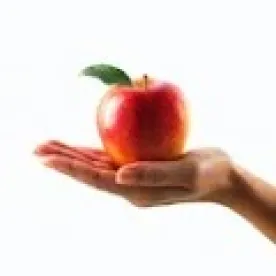According to their recent press release, Intrexon Corp (NYSE:XON) recently purchased a Canadian specialty food producer, namely Okanagan Specialty Fruits Inc., the inventor of the “Arctic®” apple. If you have not yet heard about Arctic Apples in the news, these are everyday apples that have been genetically engineered so that they no longer brown when sliced open. The process is explained on Okanagan’s website, whereby genes that cause apples to turn brown were identified, and Okanagan’s scientists use “gene silencing” technology to “turn down the expression of the gene that causes the browning.”
The USDA, in its Plant Pest Risk Assessment indicates that these apples are safe for general consumption and are “unlikely to pose a plant pest risk to agriculture and other plants in the United States.” The USDA also determined that the farming of the apples posed no “significant” threat to the environment. As of right now, only a handful of items in the produce aisle of the grocery store are genetically modified – squash, papayas and sweet corn, to name a few.
Arctic Apples are specifically destined for the fresh-cut apple slice processing and food service businesses stated Okanangan Farms president Neal Carter in a January interview with NPR: “[r]ight now, to make fresh-cut apple slices and put them in the bag, 35 or 40 percent of the cost is the antioxidant treatment. So you could make a fresh-cut apple slice 30 percent cheaper,” he said.
According to the company’s petition for USDA approval, they “see Arctic apples replacing regular apples at the retail level.” The company also expects to see a $120 million return on Arctic apple varieties within the first 10 years of commercialization.
This technology is met, however, with strong resistance from North American trade associations, such as the U.S. Apple Association, Northwest Horticulture Council and British Columbia Fruit Growers Association, who are concerned about the food safety ramifications of these Arctic apples that will appear to be fresher than they really are. A recent Canadian news outlet poll shows that just over half of consumers would knowingly consume an Arctic Apple. Andrew Kimbrell, executive director for the Center for Food Safety states that the fruit “poses numerous risks to apple growers, the food industry and consumers… For USDA to turn a blind eye to these risks for such an inessential technological 'advance' is foolish and potentially costly."
Being focused on insurance, we wonder if there are issues that could lead to insurance claims and disputes regarding coverage, for example:
-
According to a Friends of the Earth press release, “GMO apples may contaminate nearby organic and conventional apple orchards and could potentially cause valuable export markets to reject U.S. apples as happened in past when wheat and rice crops were found to be contaminated by GMOs.”
-
Could there be claims against growers of the Arctic Apple along the lines of those made against Syngenta by U.S. corn growers for revenue losses due to decreased demand by closed export markets?
-
-
Another grower consortium feels that consumers could be misled by the quality or freshness of the apples being masked by its non-browning appearance.
-
Could a class of consumers bring suit against the growers (and their insurers) under consumer protection statutes? Would such claims be covered?
-
If you are an insurance carrier, are your insureds expecting coverage for liability associated with these sorts of risks if and when they occur? These sorts of issues raise important questions for food producers and insurance companies alike. Exploring policies and other liability-related legal documents at early stages can ensure that you or your insurer/insured has not bitten off a bigger piece of the apple than they can chew.




 />i
/>i
